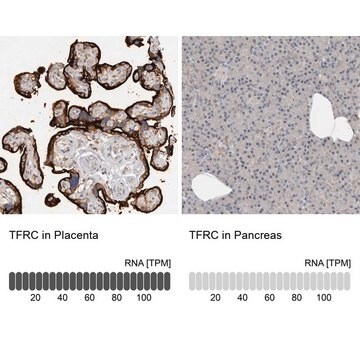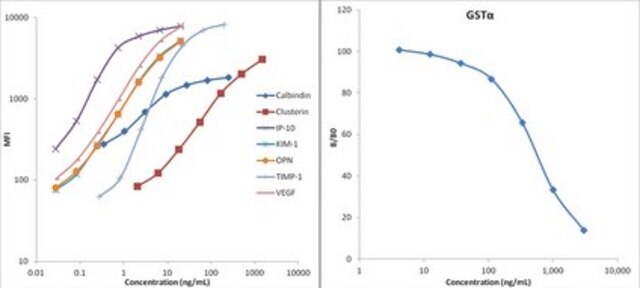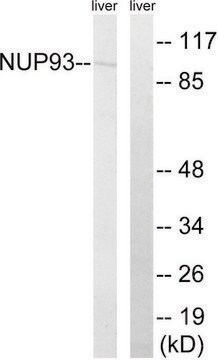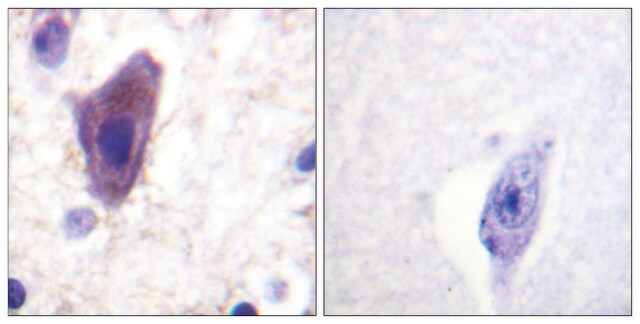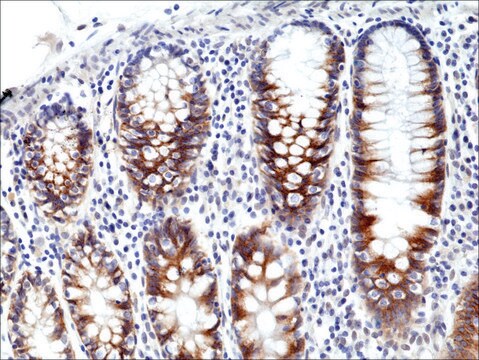SAB4700519
Monoclonal Anti-CD71-PE antibody produced in mouse
clone MEM-75, purified immunoglobulin, buffered aqueous solution
Synonim(y):
Anti-TFRC, Anti-Transferrin Receptor
Zaloguj sięWyświetlanie cen organizacyjnych i kontraktowych
About This Item
Kod UNSPSC:
12352203
NACRES:
NA.41
Polecane produkty
pochodzenie biologiczne
mouse
Poziom jakości
białko sprzężone
phycoerythrin (R-PE) conjugate
forma przeciwciała
purified immunoglobulin
rodzaj przeciwciała
primary antibodies
klon
MEM-75, monoclonal
Formularz
buffered aqueous solution
reaktywność gatunkowa
human
metody
flow cytometry: suitable
izotyp
IgG1
numer dostępu NCBI
numer dostępu UniProt
Warunki transportu
wet ice
temp. przechowywania
2-8°C
docelowa modyfikacja potranslacyjna
unmodified
informacje o genach
human ... TFRC(7037)
Opis ogólny
Cluster of differentiation 71 (CD71), also known as transferrin receptor, is encoded by the gene mapped to human chromosome 3q29. CD71 is present on cells with high proliferation.
The antibody MEM-75 reacts with CD71 antigen (transferrin receptor), a 95 kDa type II homodimeric transmembrane glycoprotein expressed on activated B and T lymphocytes, macrophages and erythroid precursors; it is lost on resting blood leukocytes.
Immunogen
NALM-6 human pre-B cell line
Zastosowanie
Monoclonal Anti-CD71-PE antibody produced in mouse has been used to estimate the cell surface transferrin receptor (TfR) levels.
The reagent is designed for Flow Cytometry analysis of human blood cells using 20 μL reagent / 100 μL of whole blood or 1e6 cells in a suspension. The content of a vial (2 mL) is sufficient for 100 tests.
Działania biochem./fizjol.
Cluster of differentiation 71 (CD71) functions as an iron regulatory protein. Overexpression of the gene has been associated with the development of various types of cancers, including cholangiocarcinoma (CCA). Thus, CD71 protein is considered as a potential therapeutic target for CCA and iron overload. The encoded protein facilitates mitochondrial respiration and reactive oxygen species (ROS) production in human pancreatic ductal adenocarcinoma (PDAC) cells, which is essential for their tumorigenic growth. Thus, aberrant expression of CD71 might also lead to the development of pancreatic cancer.
Cechy i korzyści
Evaluate our antibodies with complete peace of mind. If the antibody does not perform in your application, we will issue a full credit or replacement antibody. Learn more.
Postać fizyczna
Solution in phosphate buffered saline containing 15 mM sodium azide and 0.2% high-grade protease free BSA as a stabilizing agent.
Oświadczenie o zrzeczeniu się odpowiedzialności
Unless otherwise stated in our catalog or other company documentation accompanying the product(s), our products are intended for research use only and are not to be used for any other purpose, which includes but is not limited to, unauthorized commercial uses, in vitro diagnostic uses, ex vivo or in vivo therapeutic uses or any type of consumption or application to humans or animals.
Ta strona może zawierać tekst przetłumaczony maszynowo.
Nie możesz znaleźć właściwego produktu?
Wypróbuj nasz Narzędzie selektora produktów.
Kod klasy składowania
10 - Combustible liquids
Klasa zagrożenia wodnego (WGK)
WGK 2
Temperatura zapłonu (°F)
Not applicable
Temperatura zapłonu (°C)
Not applicable
Wybierz jedną z najnowszych wersji:
Masz już ten produkt?
Dokumenty związane z niedawno zakupionymi produktami zostały zamieszczone w Bibliotece dokumentów.
Intracellular labile iron determines H2O2-induced apoptotic signaling via sustained activation of ASK1/JNK-p38 axis
Mantzaris MD
Free Radical Biology & Medicine, 454-465, 454-465 (2016)
Upregulation of transferrin receptor-1 induces cholangiocarcinoma progression via induction of labile iron pool
Jamnongkan W
Tumour Biology : the Journal of the International Society For Oncodevelopmental Biology and Medicine, 39 (2017)
NotI linking/jumping clones of human chromosome 3: mapping of the TFRC, RAB7 and HAUSP genes to regions rearranged in leukemia and deleted in solid tumors.
Kashuba VI
Febs Letters, 419, 181-185 (1997)
Yuxia Li et al.
Molecules and cells, 37(3), 213-219 (2014-03-13)
MicroRNAs (miRNAs) represent a class of small non-coding regulatory RNAs that play important roles in normal hematopoiesis, including erythropoiesis. Although studies have identified several miRNAs that regulate erythroid commitment and differentiation, we do not understand the mechanism by which the
Transferrin receptor regulates pancreatic cancer growth by modulating mitochondrial respiration and ROS generation.
Jeong SM
Biochemical and Biophysical Research Communications, 471, 373-379 (2016)
Nasz zespół naukowców ma doświadczenie we wszystkich obszarach badań, w tym w naukach przyrodniczych, materiałoznawstwie, syntezie chemicznej, chromatografii, analityce i wielu innych dziedzinach.
Skontaktuj się z zespołem ds. pomocy technicznej